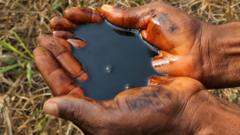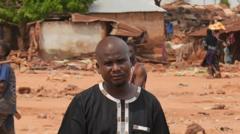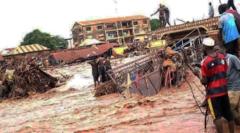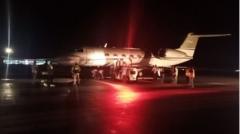The allegations raise questions about Shell's commitment to responsible environmental practices in Nigeria.
**Shell "Scam" Allegations Uncovered in Nigeria's Oil Clean-Up Efforts**

**Shell "Scam" Allegations Uncovered in Nigeria's Oil Clean-Up Efforts**
Investigation reveals Shell's neglect and irregularities within oil remediation in Ogoniland, fueling concerns among local communities.
In a revealing investigation, the BBC has brought to light serious claims against Shell regarding its handling of a major clean-up operation in Ogoniland, southern Nigeria. Despite Shell's and the Nigerian government's public assurances of progress in cleaning oil-polluted areas—an initiative that began nearly a decade ago—repeated warnings from experts and locals suggest otherwise.
Internal documents and testimony gathered by the BBC allege that this clean-up, financed by oil companies contributing approximately $1 billion, has been riddled with corruption and inefficiencies. Described by critics as a "con" and "scam," the initiative has reportedly mismanaged funds, leaving the community to endure the harmful consequences of oil pollution unhindered for years, well beyond the 13 years since a landmark UN report highlighted the area's critical situation.
Shell maintains that external factors such as rampant oil theft complicate their operations. They claim to have addressed spills adequately when they occur, ensuring compensation and community support. However, as legal proceedings are set to take place in London, representatives from certain Ogoniland communities demand accountability for oil polluting incidents attributed to Shell's infrastructure between 1989 and 2020.
Families in the affected regions, with inadequate access to clean water due to contaminated boreholes, assert that the pollution has forced them to purchase potable water at steep prices. Local voices lament the destruction of once bountiful natural resources and the distress caused by health issues linked to polluted water sources. One mother described the catastrophic impact on her family, affected by health problems and the loss of loved ones due to contamination.
This situation, now regarded as a pressing environmental crisis, has been explored in past UN reports, highlighting that comprehensive clean-up efforts in Ogoniland could require decades. The Hydrocarbon Pollution Remediation Project (Hyprep)—previously launched by the Nigerian government and partially funded by oil companies like Shell—has also come under scrutiny. Whistleblower accounts reveal longstanding issues with Hyprep, including cronyism in contracting and falsification of cleanup results.
Despite Shell's claims of using best practices to combat oil theft and spills, the experience of local communities paints a stark picture of neglect and ongoing struggles. While Shell prepares for a potential transition in operations through sales to local consortiums, residents express skepticism about future accountability and effective remediation processes.
The complex dynamics involving oil extraction, local livelihoods, and governmental oversight continue to challenge the Niger Delta region, where Shell's historical presence raises concerns about future resource management. With the onset of litigation, the spotlight is positioned firmly on accountability in what many consider an environmental travesty still unresolved.
Internal documents and testimony gathered by the BBC allege that this clean-up, financed by oil companies contributing approximately $1 billion, has been riddled with corruption and inefficiencies. Described by critics as a "con" and "scam," the initiative has reportedly mismanaged funds, leaving the community to endure the harmful consequences of oil pollution unhindered for years, well beyond the 13 years since a landmark UN report highlighted the area's critical situation.
Shell maintains that external factors such as rampant oil theft complicate their operations. They claim to have addressed spills adequately when they occur, ensuring compensation and community support. However, as legal proceedings are set to take place in London, representatives from certain Ogoniland communities demand accountability for oil polluting incidents attributed to Shell's infrastructure between 1989 and 2020.
Families in the affected regions, with inadequate access to clean water due to contaminated boreholes, assert that the pollution has forced them to purchase potable water at steep prices. Local voices lament the destruction of once bountiful natural resources and the distress caused by health issues linked to polluted water sources. One mother described the catastrophic impact on her family, affected by health problems and the loss of loved ones due to contamination.
This situation, now regarded as a pressing environmental crisis, has been explored in past UN reports, highlighting that comprehensive clean-up efforts in Ogoniland could require decades. The Hydrocarbon Pollution Remediation Project (Hyprep)—previously launched by the Nigerian government and partially funded by oil companies like Shell—has also come under scrutiny. Whistleblower accounts reveal longstanding issues with Hyprep, including cronyism in contracting and falsification of cleanup results.
Despite Shell's claims of using best practices to combat oil theft and spills, the experience of local communities paints a stark picture of neglect and ongoing struggles. While Shell prepares for a potential transition in operations through sales to local consortiums, residents express skepticism about future accountability and effective remediation processes.
The complex dynamics involving oil extraction, local livelihoods, and governmental oversight continue to challenge the Niger Delta region, where Shell's historical presence raises concerns about future resource management. With the onset of litigation, the spotlight is positioned firmly on accountability in what many consider an environmental travesty still unresolved.




















